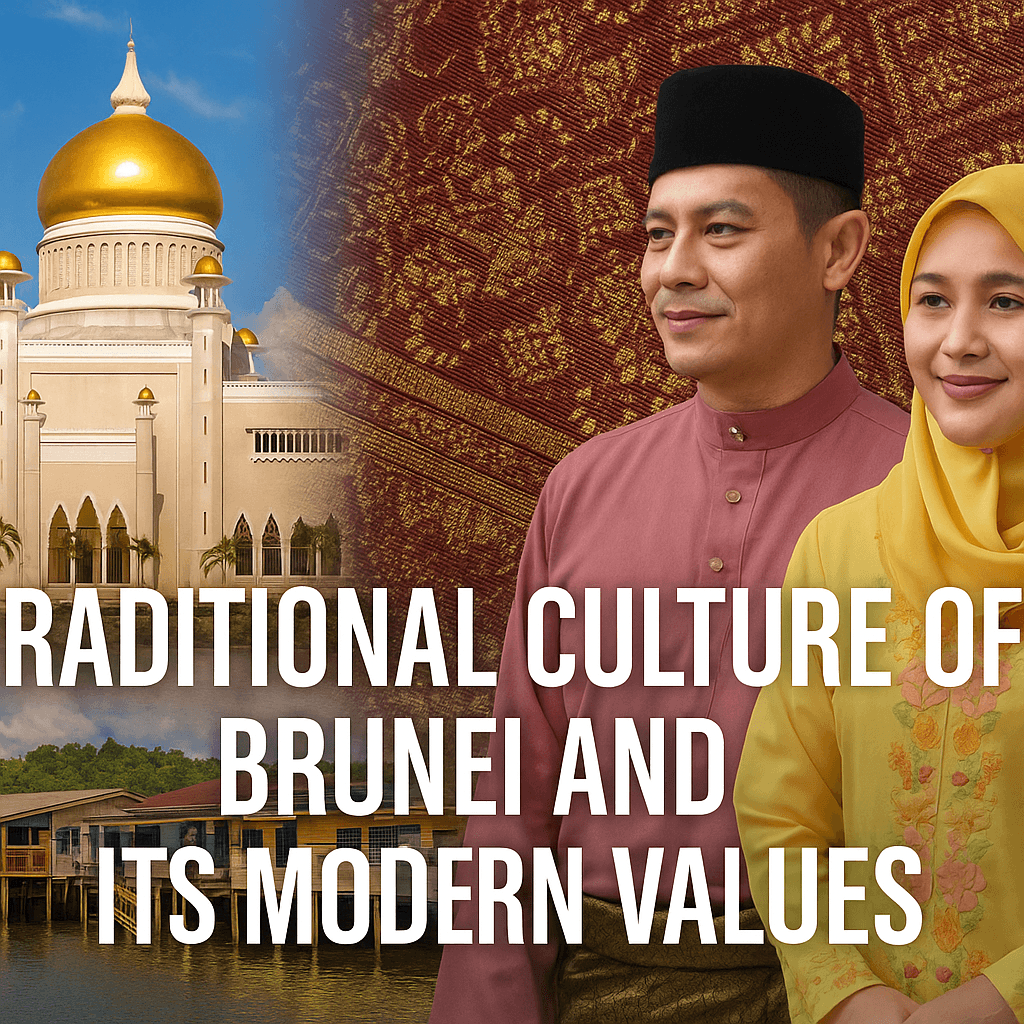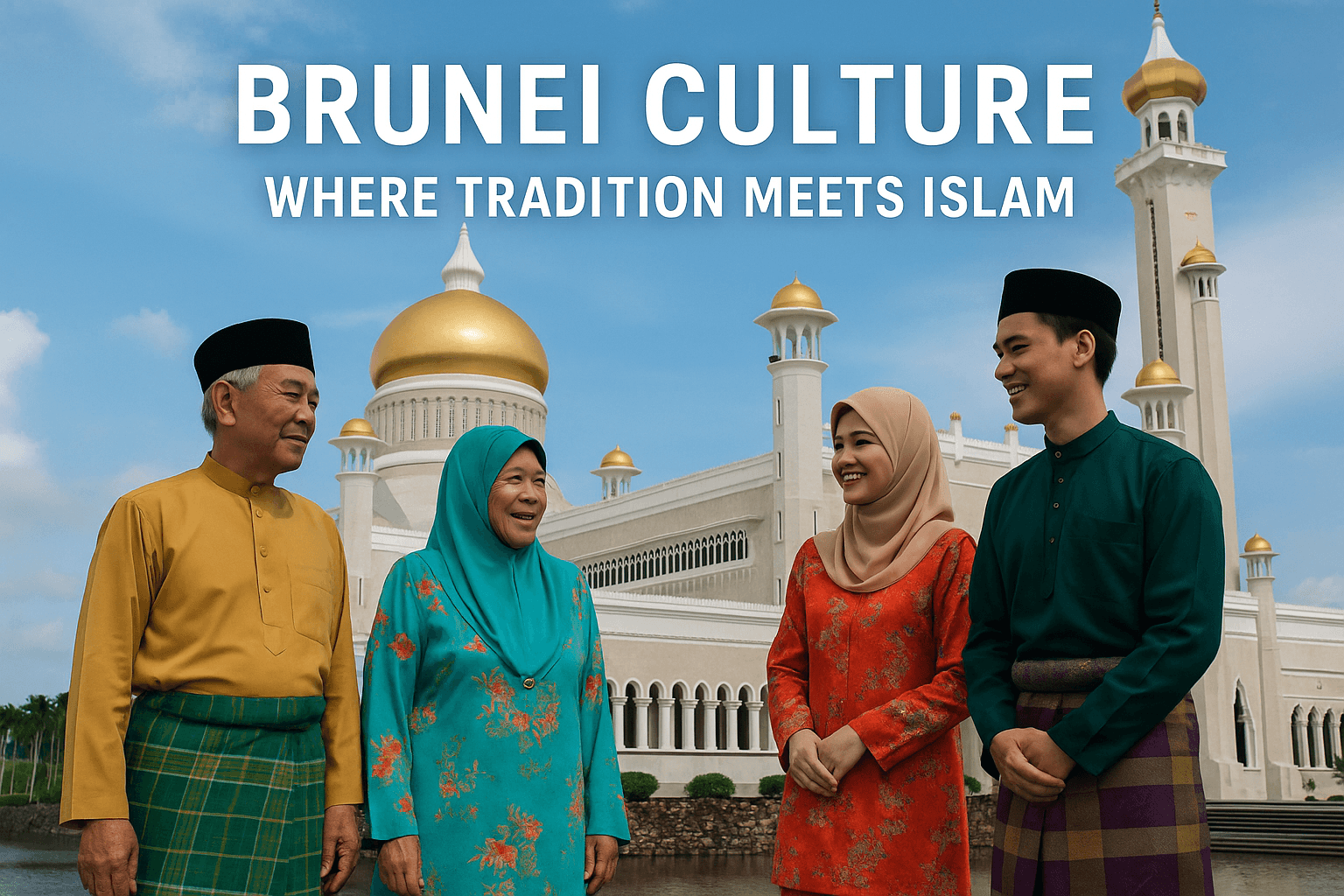The nation of Brunei Darussalam is a small yet culturally rich country on the island of Borneo. While many travelers recognize it for its wealth and peaceful atmosphere, the deeper reality is that Brunei thrives on a heritage built from centuries of traditions, Islamic teachings, Malay identity, and an openness to modern influences. Exploring the Traditional Culture of Brunei and Its Modern Values reveals how this kingdom balances timeless customs with the demands of contemporary life.
This article will examine how Brunei’s traditions in art, architecture, language, social customs, and Islamic faith continue to thrive, while also adapting to global changes. Through this lens, one can understand how cultural identity is preserved yet modernized to shape Brunei’s national image today.

The Foundations of Traditional Brunei Culture
Malay Islamic Monarchy Philosophy
At the core of the Traditional Culture of Brunei and Its Modern Values lies the Malay Islamic Monarchy, locally called “Melayu Islam Beraja” or MIB. This philosophy defines Brunei’s political structure, cultural orientation, and religious foundation. Malay culture sets the ethnic identity, Islam establishes spiritual and moral values, while the monarchy provides stability and unity.
The MIB framework influences everyday life, from family structures and clothing styles to festivals and governance. This philosophy bridges the ancient traditions of the Bruneian people with the modern responsibilities of a sovereign state.
Language as Cultural Identity
The Malay language, particularly the Brunei Malay dialect, acts as the vessel of traditional expression. Oral storytelling, poetry, and proverbs still play an essential role in transmitting wisdom. While English is widely used in business and education, the local dialect ensures that generational continuity and authenticity are maintained. Language is both a traditional anchor and a modern tool for global communication.
Art and Craft Traditions
Weaving and Songket
Handwoven textiles known as songket represent luxury, prestige, and artistry. Traditionally woven with gold or silver threads, songket was worn during weddings, royal ceremonies, and national festivals. Today, these textiles continue to symbolize status but are also marketed as cultural heritage items in exhibitions and fashion shows.
The ability of songket to transition from traditional clothing into modern fashion demonstrates how the Traditional Culture of Brunei and Its Modern Values interact in practical ways.
Silverwork and Brasswork
Brunei’s artisans are known for intricate metalwork, particularly in the production of ceremonial items, betel nut containers, and decorative vessels. These crafts showcase Islamic geometric patterns and floral motifs. Though industrial goods dominate modern households, silver and brass artifacts remain treasured symbols of Brunei’s heritage.
Architecture: Traditional Meets Modern
Kampong Ayer
Kampong Ayer, the “Water Village,” is often called the Venice of the East. For centuries, Bruneians have lived in wooden houses on stilts above the Brunei River. With schools, mosques, and shops built on water, it reflects resilience and adaptation.
Modern upgrades such as electricity, internet, and water supply have transformed the village into a living museum. The government actively supports its preservation, ensuring that the Traditional Culture of Brunei and Its Modern Values coexist for both locals and tourists.
Royal Palaces and Mosques
The Sultan Omar Ali Saifuddien Mosque is a perfect example of blending tradition with modernity. Its golden dome and Italian marble showcase Islamic design while embracing international craftsmanship. Similarly, Istana Nurul Iman, the royal palace, combines Malay-Islamic aesthetics with modern architectural grandeur.
Festivals and Celebrations
Hari Raya Aidilfitri
The most celebrated festival in Brunei is Hari Raya Aidilfitri. Rooted in Islamic traditions, it marks the end of Ramadan with prayers, family gatherings, and open houses hosted by the Sultan himself. While steeped in religious significance, the celebrations incorporate modern hospitality, media coverage, and global awareness.
Royal Birthdays and National Day
Festivals such as the Sultan’s birthday and Brunei National Day highlight loyalty, unity, and respect for monarchy. Traditional parades with cultural performances now blend with modern entertainment and mass media, showing how Brunei’s traditions find relevance in a digital era.
Social Customs and Etiquette
Bruneian society values politeness, modesty, and community respect. Traditional greetings such as the “salamat datang” welcome are performed with sincerity, and Islamic etiquette guides behavior in both private and public life.
Modern influences, such as technology and global business etiquette, have not erased these customs. Instead, Bruneians adapt by integrating online communication with traditional politeness, ensuring that values remain intact.
Cuisine as Cultural Heritage
Brunei’s food culture is a reflection of its geography and history. Traditional dishes like ambuyat, nasi katok, and satay are deeply tied to local identity. At the same time, modern restaurants and international cuisines coexist in Bandar Seri Begawan.
The culinary scene shows that the Traditional Culture of Brunei and Its Modern Values is not about rejection of modernity, but about embracing change while retaining authenticity.
Islamic Values in Daily Life
Islam is central to Brunei’s national identity. The five daily prayers, modest clothing, and halal dietary practices form the foundation of society. Education integrates Islamic teachings with modern sciences, ensuring a holistic approach to development.
In workplaces, ethical business practices guided by Islamic principles align with global standards of professionalism. This harmony illustrates the practical application of cultural and religious traditions in modern life.
Modernization and Globalization
Education and Knowledge
Brunei invests heavily in education, combining traditional moral instruction with modern academic disciplines. Universities emphasize Islamic values alongside global competitiveness, ensuring that students can thrive in the international market without losing cultural roots.
Technology and Communication
Social media platforms, smartphones, and digital innovation are widely used in Brunei. Yet, cultural and religious guidelines regulate content and behavior. This reflects how the Traditional Culture of Brunei and Its Modern Values provides a framework for responsible modernization.
Gender Roles and Modern Shifts
Traditionally, gender roles in Brunei emphasized family responsibilities, with men as providers and women as caretakers. Modern values have expanded these roles, with women participating in leadership, education, and professional fields. Despite these shifts, family respect and modesty remain core principles.
Environmental and Community Values
Brunei’s respect for nature stems from traditional views of harmony between people and the environment. Forests, rivers, and seas are treated as gifts to be preserved. Modern environmental policies align with these traditional beliefs, positioning Brunei as a leader in conservation in Southeast Asia.
The Balance of Tradition and Progress
The story of the Traditional Culture of Brunei and Its Modern Values is one of balance. Instead of discarding customs for the sake of modernity, Brunei carefully integrates heritage into national progress. This cultural strategy ensures that the people remain connected to their identity while benefiting from economic and technological growth.
Conclusion
Brunei Darussalam represents a rare example of a nation where traditions are not overshadowed by modernization. Instead, they form the very foundation upon which progress is built. The Traditional Culture of Brunei and Its Modern Values is a living model of how a society can honor its past while embracing its future.
From Kampong Ayer to modern universities, from songket weaving to digital communication, Brunei demonstrates that tradition and modernity are not opposing forces but complementary strengths. For anyone seeking to understand how heritage can thrive in a globalized world, Brunei stands as a valuable case study.

